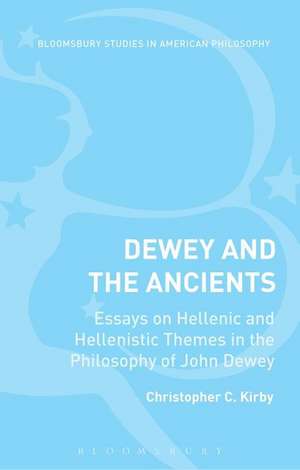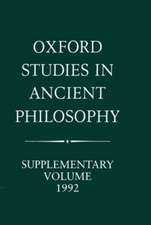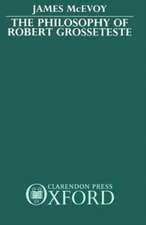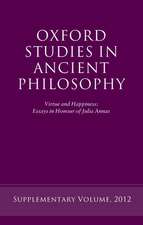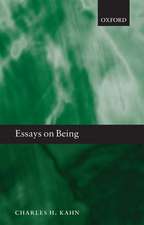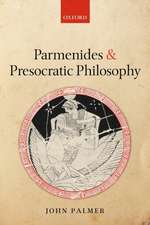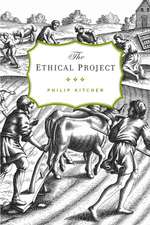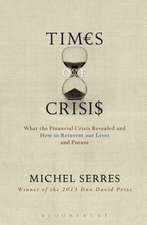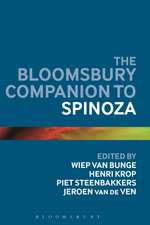Dewey and the Ancients: Essays on Hellenic and Hellenistic Themes in the Philosophy of John Dewey: Bloomsbury Studies in American Philosophy
Editat de Christopher C. Kirbyen Limba Engleză Hardback – 7 mai 2014
| Toate formatele și edițiile | Preț | Express |
|---|---|---|
| Paperback (1) | 257.03 lei 6-8 săpt. | |
| Bloomsbury Publishing – 18 noi 2015 | 257.03 lei 6-8 săpt. | |
| Hardback (1) | 773.39 lei 6-8 săpt. | |
| Bloomsbury Publishing – 7 mai 2014 | 773.39 lei 6-8 săpt. |
Preț: 773.39 lei
Preț vechi: 990.21 lei
-22% Nou
Puncte Express: 1160
Preț estimativ în valută:
147.98€ • 154.93$ • 122.45£
147.98€ • 154.93$ • 122.45£
Carte tipărită la comandă
Livrare economică 07-21 aprilie
Preluare comenzi: 021 569.72.76
Specificații
ISBN-13: 9781472510556
ISBN-10: 1472510550
Pagini: 240
Dimensiuni: 156 x 234 x 23 mm
Greutate: 0.5 kg
Ediția:New.
Editura: Bloomsbury Publishing
Colecția Bloomsbury Academic
Seria Bloomsbury Studies in American Philosophy
Locul publicării:London, United Kingdom
ISBN-10: 1472510550
Pagini: 240
Dimensiuni: 156 x 234 x 23 mm
Greutate: 0.5 kg
Ediția:New.
Editura: Bloomsbury Publishing
Colecția Bloomsbury Academic
Seria Bloomsbury Studies in American Philosophy
Locul publicării:London, United Kingdom
Caracteristici
Dewey's lost manuscript, Unmodern Philosophy and Modern Philosophy, shows his essential connection to ancients
Notă biografică
Christopher C. Kirby is Associate Professor of Philosophy, Eastern Washington University, USA.
Cuprins
List of ContributorsAcknowledgementsA Note on ConventionsDewey and the Ancients: Editor's Introduction, Christopher C. KirbyPart I: Dewey and the Greek Tradition1. Dewey and Ancient Philosophies: The Unfinished Cultural Project, John P. Anton2. Potentiality and Naturalism: Dewey's Metaphysical Metamorphosis, Thomas M. Alexander3. Dewey and "the Greeks:" Inquiry and the Organic Spirit of Greek Philosophy, Christopher C. KirbyPart II: Dewey and Plato 4. Let Education in the Cave: Reclaiming a Progressive Political Role for the Individual in a Modern Democracy, Vasiliki Karavakou5. The Dialogues as Dramatic Rehearsal: Plato's Republic and the Moral Accounting Metaphor, Albert R. Spencer6. Justice in Society and the Individual: A Comparison of Plato's Republic and Dewey's Great Community, Philip Schuyler BishopPart III: Dewey and Aristotle 7. Dewey, Aristotle and the Spectator Theory of Knowledge, Kevin S. Decker8. Beyond Fixed Ends and Limited Moral Community: Aristotle, Dewey, and Contemporary Applications in Ethics, Heather E. Keith9. How to Make Our Passions Clear: How Aristotle's Understanding of the Passions Enriches the Deweyean Conception of Changing Human Nature, Brent LamonsPart IV: Dewey and the Hellenistic Thought 10. Epicurean Pragmatism, Charles A. Hobbs11. The Peace of the Sword: Dewey and Pyrrhonian Skepticism, Joel AmnottIndex
Recenzii
All in all, this volume constitutes a valuable tool for the study of one aspect of Dewey's thought that has long been neglected, and it surely contributes to a better understanding of the overall project of pragmatism by placing it in continuity with ancient lines of thought.
Christopher C. Kirby and his collaborators have produced a beautifully conceived and articulated collection of essays that illuminates a long neglected facet of John Dewey's philosophy. Their insights enlarge our understanding of Dewey's-and our own-enormous debt to the thinkers who invented Western philosophy.
Christopher C. Kirby and his collaborators have produced a beautifully conceived and articulated collection of essays that illuminates a long neglected facet of John Dewey's philosophy. Their insights enlarge our understanding of Dewey's-and our own-enormous debt to the thinkers who invented Western philosophy.
